US Sends Ammunition Seized From Iran To Ukraine
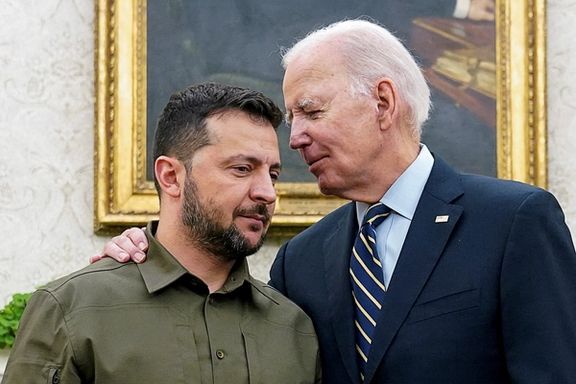
The US has sent Ukraine more than 1 million rounds of Iranian ammunition that had been seized last year, the US military said on Wednesday.

The US has sent Ukraine more than 1 million rounds of Iranian ammunition that had been seized last year, the US military said on Wednesday.
US Central Command, which is responsible for military operations in the Middle East, said about 1.1 million 7.62 mm rounds were sent to Ukraine. US naval forces for years have been seizing weapons bound for Iran-backed fighters in Yemen, usually transported by fishing vessels.
They were originally seized by US naval forces in December 2022 while being transferred from Iran's Revolutionary Guards to Houthi forces in Yemen “in violation of the United Nations Security Council Resolution 2216.”
“The government obtained ownership of these munitions on July 20, 2023, through the Department of Justice’s civil forfeiture claims against Iran’s Islamic Revolutionary Guard Corps (IRGC),” the Central Command said in its statement.
"The US is committed to working with our allies and partners to counter the flow of Iranian lethal aid in the region by all lawful means including US and UN sanctions and through interdictions," it added.
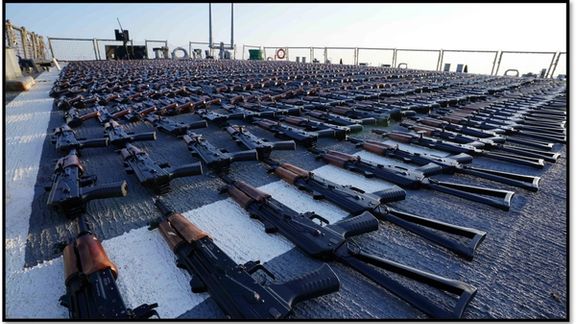
“Iran’s support for armed groups threatens international and regional security, our forces, diplomatic personnel, and citizens in the region, as well as those of our partners. We will continue to do whatever we can to shed light on and stop Iran’s destabilizing activities.”
Last year, Britain's Royal Navy said one of its warships had seized Iranian weapons, including surface-to-air-missiles and engines for cruise missiles, from smugglers in international waters south of Iran.
Yemen's Houthi movement has battled a Saudi-led coalition since 2015 in a conflict that has killed hundreds of thousands and left 80% of the population dependent on aid.
(With reporting by Reuters)

Iran says the International Atomic Energy Agency inspectors banned from its nuclear sites were political "extremists" as it tried to justify its standing in the way of vital work.
Head of the Atomic Energy Organization of Iran (AEOI), Mohammad Eslami, justified Tehran's recent decision to ban what Director General of the IAEA, Raphael Grossi, said was around one third of the international inspection team, claiming those expelled had a history of "extremist political behavior".
Downplaying the scale, he said it was an "insignificant" number expelled, contradicting the statement by Grossi in which he made a rare public criticism of the regime for its obstructive behavior last month.
“With today’s decision, Iran has effectively removed about one third of the core group of the Agency’s most experienced inspectors designated for Iran,” Grossi said in a statement, adding that the move "affects in a direct and severe way the ability of the IAEA to effectively conduct its inspections in Iran.”
The public statements by the head of AEOI this week come after the Iranian regime and the International Atomic Energy Agency engaged in a verbal dispute over Tehran's opposition to the appointment of certain French and German inspectors. A statement shortly after, prepared by Britain, France, and Germany, known as the E3, stated that Iran was not adhering to its safeguard obligations.
On September 18, the IAEA, along with the support of the US, Britain, France, and Germany, termed Tehran's decision as “unprecedented unilateral measure,” urging Iran to reconsider it.
Tehran, which repeatedly denies any military intentions in its nuclear program, announced on Wednesday through Foreign Minister Hossein Amir-Abdollahian that there are "new developments" in connection with the JCPOA negotiations. Naser Kanaani, the spokesperson for Iran's Ministry of Foreign Affairs, also stated on Tuesday that Tehran is calling for the return of all parties to the JCPOA.
However, Matthew Miller, the spokesperson for the US State Department, said on Tuesday that “I think we are a long way off from Iran even considering re-entering the JCPOA, given that they just in the past few weeks refused IAEA inspectors. So our policy hasn’t really changed. We’re committed to ensuring that they do not have a nuclear weapon.”
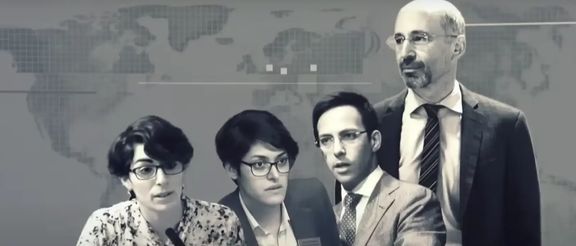
The discovery of an Iranian influence network in the United States and in Europe has alarmed many politicians and experts, prompting further scrutiny.
Iran International’s exposé, Inside Tehran’s Soft War: How Iran Gained Influence in US Policy Centers, by Bozorgmehr Sharafedin, and its twin report by Semafor’s Jay Salomon, Inside Iran’s Influence Operation, take the bull by its horns with its digital evidence of the existence of the “Iran Experts Network”, whereby members acted as agent provocateurs of the regime.
These reports stand out for their presentation of actual emails exchanged between US-Iranian experts and Iranian top diplomats. The topic? “Iran Nuclear negotiations”. After reading these reports, I realized how similar the Iranian foreign ministry’s and intelligence establishment’s efforts to successfully build an “Iran Experts Network” were to the account provided by Thomas Rid’s Active Measures: the Secret History of Disinformation and Political Warfare, a seminal work on political warfare and disinformation during the Cold War.
The sense of deja vu I felt reading Sharefedin’s and Salomon’s twin reports was unnerving. I remembered Parsi v Daioleslam (2012), where Trita Parsi, the plaintiff (President of National American Iranian Council (NIAC)) sued the defendant, Hassan Daioleslam, for defamation damages. Daioleslam was a dissident with alleged connections to the Iranian opposition Mojahedin Khalq Organization (aka MEK or MKO). In April 2008, Parsi and NIAC filed a complaint “alleging Daioleslam defamed them in a series of articles and blog posts claiming that they had secretly lobbied on behalf of the Iranian regime in the United States.” Like many cases of its kind it got bogged down in discovery motions and the court eventually found that NIAC had skirted the lobby rules.”
Rid’s Active Measures once again came to mind as an interesting historical template in 2021, when the news broke of United States v. Afrasiabi (1:21-cr-00046), District Court, E.D. New York. Federal prosecutors accused Kaveh Afrasiabi, an Iran analyst, of not being a registered foreign agent per Foreign Agents Registration Act while lobbying for the Islamic Republic of Iran. Circumstantially, I saw the connection between the pro-Iran Expert lobbyists of Parsi v. Daioleslam and United States v. Afrasiabi.
Iran International-Semafor’s joint investigation goes beyond court squabbles and discovery motion wars. The “digital” hard proof, with its thousands of emails is difficult to ignore. Yet, many Iran experts dismissed the report with little reaction or surprise. In fact, some veteran diplomatic enablers of “the Iran Expert Network” have so far described the investigation as “old news.” A notable exception is David Albright, President and Founder of the Institute for Science and International Security. A veteran researcher and expert on unconventional warfare and weapons, Albright is prolific in his publications on the Iran Nuclear program and enjoys a well-deserved reputation for integrity and objectivity. In a post on the social media platform X (the former Twitter), Albright calls out such dismissive and superficial reactions:
Other than attacking people and projecting motives in an almost paranoid way, Joe Cirincione in his Substack post Anatomy of A Smearing Campaign does not even address the subject of the emails published by Iran International and Semafor. And Ali Vaez’s long twitter defense, which Joe relies on, is an incoherent mishmash, devoid of any rebuttal. Please: Quote the emails and explain them.

Albright emphasizes the compelling email evidence provided by International-Semafor's reporting. While the reports confirm suspicions of an Iran-manufactured "lobby," questions arise about the identity of the lobby members and their specific roles and functions. In short, the primary members of this “lobby” were analysts that staffed prominent Washington DC based think tanks as well as one senior policy advisor at the US Department of Defense.
The evidence presented by the report establishes that “the Iran Experts Network” became fully immersed in the roles assigned to them by Iranian officials. “The Iran Experts” became co-opted as agent provocateurs of the regime, acting as the regime’s intellectual, diplomatic, and media coup de force, doing the regime’s bidding to advance its diplomatic goals. Importantly, they aided American and European counterparts to internalize the Iranian regime’s template for “compromise.”
I first became suspicious of the existence of an unofficial “Islamic Republic of Iran Lobby” in the West in 2006 when I attended conferences in Washington DC and London. Many of my expert colleagues argued for dialogue with the Islamic Republic of Iran and its head of government, Mahmoud Ahmadinejad, dismissing most objections as “hawkish” and “warmongering”. When Ahmadinejad said, “Israel must be wiped off the map,” many countered that he had spoken figuratively and not literally. Those of us who were referred to as “Iran skeptics” found our “pro-peace” colleagues’ call for compromise and dialogue in the Ahmadinejad era as a cartoonish reincarnation of Nevil Chamberlin’s appeasement doctrine.
The administrations changed in both the US (Obama’s election in 2008) and Iran (Rohani’s election in 2013), ushering in a new era of “dialogue”. In 2014-2015, Obama’s administration led the EU, China, and Russia in their collective nuclear negotiations with Iran. At that time, I stumbled across a photograph of two Iranian American ‘analysts’ rushing after Iran’s diplomats at the hotel in Vienna where the nuclear negotiations took place. Seeing them in the retinue of top Iranian diplomats gave me pause as it appeared to be a deliberate statement. I wondered, ‘After Parsi v. Daioleslam, is the Islamic Republic publicly recruiting Iranian American scholars as the Iranian government’s American whisperers?’ It was a picturesque affirmation of longstanding suspicions about their pro-Iran lobbying.
Still, there was no “hard” proof of a quid pro quo collaboration between the experts and the Iranian regime. Iran International and Semafor’s report establishes definitive proof that the Islamic Republic of Iran’s chief foreign policy mandarins, then foreign minister Zarif and Islamic Revolutionary Guards cum diplomat Zahrani, worked in tandem with a handful of other top diplomats to bring about “the Iran Experts network.”
The reports recount how, Saeed Khatibzadeh, the head of Iran’s foreign ministry’s inhouse thinktank, detailed the initiative in a March 2014 email: “This initiative which we call ‘Iran Experts Initiative (IEI)’ consists of a core group of 6-10 distinguished second-generation Iranians who have established affiliation with the leading international think-tanks and academic institutions, mainly in Europe and the US.”
The emails’ evidentiary corroboration of the complicity of the Iran Experts cannot be more damning. In one email, Ali Vaez of international Crisis Group expresses his unrequited loyalty to the foreign minister of the Islamic Republic without reservation. In another email, he requested the Iranian diplomatic chiefs to “pre-review” an article that he was to publish in a major Western media outlet.
The parallel with Rid’s Active Measures are uncanny. Rid recounts how a US based Soviet diplomat “introduced” Alan Wolfe, one of the primary leaders of the American Peace Movement and an editor of the left leaning Nation magazine, to Soviet “academics”. The Soviet intelligence thenceforth robustly reinforced its infiltration of the American Peace Movement and turned it into an arm of its influence network in the United States. Like their contemporary Iranian American “Iran Experts Network” counterparts, certainly no peace movement activist at the time believed that they were “active measures agents” of the Soviet Union “influence work” in the US. Yet, “the Iran Experts” constantly crisscrossed and blurred the lines between “professional analyst”, “public relations advisor”, “lobbyists”, and “active measures operatives”. There is little difference between them and the US “peace activists” of the 1970s and 1980s.
Of the three US-Iranian experts discussed in Iran International-Semafor reports (Dina Esfandiyari, Ariane Tabatabai, and Ali Vaez), Ariane Tabatabai stands out for her position in the current Biden administration. As senior policy advisor at the US Department of Defense, Ariane Tabatabai is privileged with one of the highest levels of security clearance. Her email correspondence with Zahrani, the Revolutionary Guard Commander cum diplomat, reflects a similar level of loyalty, reverence, and deference as that seen in Ali Vaez's communications.
In her email of June 27, 2014, to Zahrani, she seeks his approval to attend a conference in Israel and Saudi Arabia, and further reports to him about her conversation with Prince Turki Al-Feisal of Saudi Arabia. In the said email to Zahrani, she clearly takes the role of an Iranian regime intermediary by suggesting to Prince Turki Al-Feisal that “I thought putting a workshop together with you (Iranians) and them (the Saudis) would be of interest. I did point out to him that despite the different strategic interests of Iran and Saudi Arabia, I believe there exists some room for some cooperation.” Then, she asks Zahrani: “I would like to know your opinion about this and whether this would be of interest to you?” In the last paragraph she states that “obviously” her inquiring as to whether she should go to Israel for a conference or not is “naturally a personal [decision].”
The entirety of this “personal nature” caveat strikes a Persian reader as out of place. It begs the question as to why she was asking for the opinion of these officials about something that is personally and professionally hers. The contradictory nature of “the personal query” caveat is problematic particularly as she used her work email at Harvard when asking for her patron’s approval. The syntax of the email in Persian clearly seeks permission and approval from Zahrani, not as a colleague and a co-equal, but as that of a client. Furthermore, she asks Zahrani to inquire about the opinion of the Iranian foreign minister, Javad Zarif, regarding whether she should travel to Israel or Saudi Arabia. Tabatabai appears to have acted as a fully co-opted member of "the Iran Expert Network."
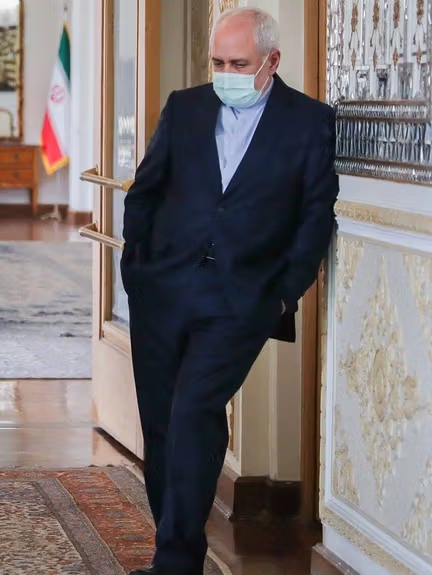
Whether “the Network” still exists in some fashion or not, the pro-Iran experts continue with their pro-Islamic Republic stance. After the brutal regime crackdown of the 2019 uprisings and last year’s “Women, Life, Freedom” movement, the so-called pro-dialogue, pro-compromise Iran experts have continued their campaign to promote Tehran’s standpoint. They reiterate the Iranian regime’s line in different intellectual colors, seeking to avoid “war” and promote “peace” between Iran and the US.
Previously, any privately or publicly expressed speculations about the Iran influence network were based on circumstantial evidence. The thousands of emails that we now have raise worrying questions and present puzzles. At what point did the network, its individual members or experts, become lobbyists, active measures agents, or double agents? How professional is it for any scholar to get permission or approval from foreign government officials before publishing their analyses?
Does the ‘Iran Expert Network’ still exist, albeit in a different shape or form? Did the Iranian regime create other specialized “influence networks” in the West, recruiting journalists, university student activists, or expat associations? Should Western democratic foreign policy decision making circles continue to listen to their “expert advice on Iran” as objective and impartial? Was Ariane Tabatabai brought in-house by the democratic administration as a reward for her 2014-2015 missions? What are the exact criteria for vetting the security clearance of someone who was deeply involved in a murky network for such a sensitive and highly coveted position as senior policy advisor to the US Department of Defense? And one last burning question: Is there a connection between the June 2023 official removal of Robert Mally as Iran envoy and the uncovering of the ‘Iran Experts Network’?
If the US had not left the Iran Nuclear Deal in the spring of 2018, history may not have availed us with the trove of thousands of emails revealing the existence of Iran’s influence network. With Trump’s departure, the JCPOA nuclear deal effectively ended and the Biden administration’s efforts to resurrect it “informally” have yet to bear fruit. Those Iran experts who now claim to have been the unwitting agents of the network must plead ignorance or incompetence.
In 1946, Winston Churchill wrote the following about the French top diplomat, Pierre Etienne Flandin (1889-1958), and his role in France’s downfall as an appeaser: “Weakness is not treason, though it may be equally disastrous.” We can only hope that “the Iran Experts’” efforts have only been out of weakness. In the meantime, we shall consign to history how “disastrous” their role might have been in the final “analysis” for the West, United States, Iran, and the world.
The opinions expressed by the author are not necessarily the views of Iran International

Iran's foreign minister says an agreement exists between Iran and Saudi Arabia ensuring this week's controversially canceled soccer match will be rescheduled.
The development follows the contentious events on Monday evening when Al-Ittihad FC was due to face Iran's Sepahan FC at Esfahan's Naghsh-e-Jahan Stadium but the Saudi team refused to play while a bust of former Quds Force commander Qassem Soleimani was on display.
Hossein Amir-Abdollahian said an approach to the Asian Football Confederation (AFC) had been made requesting "a technical assessment of the incident" claiming "there is an agreement between us and Saudi Arabia for the game to be replayed at a later agreed-upon time".
The players refused to leave their dressing room in Monday night's protest against the homage to Soleimani who was associated with Houthi militia attacks on Saudi targets during the long-standing Yemen war before his death in a 2020 US airstrike in Baghdad.
Instead of participating in the match, the Saudi team promptly departed for Saudi Arabia from the airport.
Subsequently, the Iranian club announced its intention to file a lawsuit against the Saudi team with the AFC while Al-Ittihad attributed the match's cancellation to the hosts. A Saudi sports television program quoted an unnamed source from the club, claiming that the Iranians had been asked to remove the bust before the match.
Trying to calm things with Saudi, just months after the renewal of diplomatic ties, Amir-Abdollahian reiterated the importance of maintaining the progress in Tehran and Riyadh's relations, urging against allowing sports to be exploited as a political tool.
In 2018, Saudi Arabia designated Soleimani and other IRGC commanders as terrorists, accusing them of involvement in attacks on Persian Gulf shipping and oil facilities.
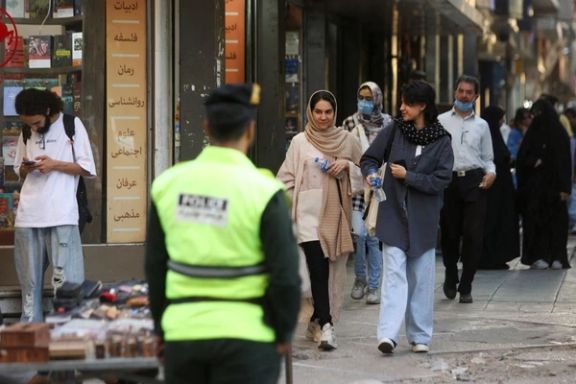
Another woman has been hospitalized after a confrontation with security personnel at the University of Tehran for defying mandatory hijab.
The incident occurred at the Faculty of Agriculture and Natural Resources on Monday, but as of Wednesday, there is no available information regarding her current condition, as reported by the Students Trade Unions Council.
The incident echoes a disturbing trend, with a teenage girl still in a coma following a similar encounter with hijab enforcers, reminiscent of the night when Mahsa Amini lost her life.
On Sunday, Armita Geravand lost consciousness when her head struck a pole, during a dispute over her hijab with enforcers who pushed her against a subway car pole in Tehran. A photo of her in a coma at Fajr Hospital's intensive care unit was shared by the Hengaw Organization for Human Rights.
The regime has stationed hijab police at all subway stations in Tehran as part of intensified hijab enforcement, which has become increasingly stringent since last September when 22-year-old Iranian-Kurdish woman Mahsa Amini died in police custody, sparking the Women, Life, Freedom protests.
In response to Armita's situation, Annalena Baerbock, the German Foreign Minister, expressed her distress on X, stating, "It’s unbearable."
Iranian authorities are handling the situation in a manner similar to Mahsa Amini's case. They arrested a journalist attempting to report on Geravand’s situation and aired a video of her parents at the hospital, describing the incident as an accident.
Member of the European Parliament Hannah Neumann has also urged the EU Foreign Policy Chief Josep Borrell to reconsider its policy towards the Iranian regime, stating, " another young woman beaten into coma for not wearing her Hijab properly."

Washington says it has no interest in Supreme Leader Khamenei's perspective on the ongoing normalization of ties between Israel and its Arab neighbors.
On Tuesday, embittered by the region’s rapidly warming ties to Iran’s archenemy Israel, he stated that governments engaging in normalization would be “betting on a losing horse”.
In response, Deputy US State Department spokesman Vedant Patel commented during a press briefing, "I’m not sure that we are really interested in the supreme leader’s point of view on this, when it comes to what we think could be a potentially transformative normalization agreement for the region."
Referring to US-brokered talks underway to formalize Saudi-Israel relations, he asserted that the benefits of normalization, including building a united force against Iran’s regional proxies, far outweighs any such talk of risk.
Saudi would be the latest country to join the transformative normalization begun under the Abraham Accords in 2020, when countries including the United Arab Emirates and Bahrain broke a decades long stalemate, resulting in huge economic benefits in addition to security ties.
Israeli Prime Minister Benjamin Netanyahu also dismissed the Iranian leader’s statement.
“While Khamenei’s terrorist regime exports ruin and destruction, Israel is advancing progress and peace,” Netanyahu said.